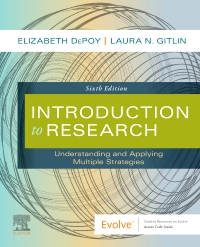
Introduction to Research Elsevier eBook on VitalSource, 6th Edition
Elsevier eBook on VitalSource

Now $69.34
Learn the latest healthcare and human service research methods! Introduction to Research: Understanding and Applying Multiple Strategies, 6th Edition helps bridge the gap between research and practice by giving you a solid foundation for critiquing your own work. This easy-to-read guide covers all the major research design strategies: qualitative, quantitative, naturalistic, experimental-type, and mixed method. Plus, the 6th edition has been updated to include contemporary references, an expanded discussion of big data, updated research methods, and more!
-
- Comprehensive coverage of research designs helps you to further understand how to apply these methods to healthcare and human service settings
- Detailed coverage of qualitative and quantitative methodologies offer a unique and balanced focus that makes this text more comprehensive than others in its field
- Case examples provide real-life snapshots of what it is like to participate in different types of research processes, identify research dilemmas relevant to chapter subjects, and alert you to problems you might encounter
-
- NEW! Contemporary, practice examples give you a highly relevant understanding of today’s changing health and human service environments
- NEW! In-depth analysis of big data and data analytics expands your understanding of how to apply these numbers to health and human service research
- NEW! More emphasis on technology in research and research informed practice ensures you understand the latest methods available to you
- NEW! Expanded discussion of naturalistic methods improve your ability to understand and integrate varying methods
- NEW! Updated research methods, strategies, and references provide you with the latest information on research in diverse areas of health and human services
-
Part I: Introduction
1. Research as an Important Way of Knowing
2. Essentials of Research
3. Research Ethics
Part II: Thinking Processes
4. Philosophical Foundations
5. Framing the Problem
6. Developing a Knowledge Base Through Literature and Resources
7. Theory in Research
8. Formulating Research Questions and Queries
9. Language and Thinking Processes
Part III: Design Approaches
10. Experimental-Type Designs
11. Naturalistic Designs
12. Mixed Method Designs
Part IV: Action Processes
13. Setting the Boundaries of a Study
14. Boundary Setting in Experimental-Type Designs
15. Boundary Setting in Naturalistic Designs
16. Collecting Information
17. Collecting Data Through Measurement in Experimental-Type Research
18. Gathering Information in Naturalistic Inquiry
19. Preparing and Organizing Data
20. Statistical Analysis for Experimental-Type Designs
21. Analysis in Naturalistic Inquiry
22. Sharing Research Knowledge Before the Study
23. Sharing Research Knowledge During and After the Study
Part V: Improving Practice Through Inquiry
24. Reciprocal Role of Research and Practice
25. Stories from the Field


 as described in our
as described in our 